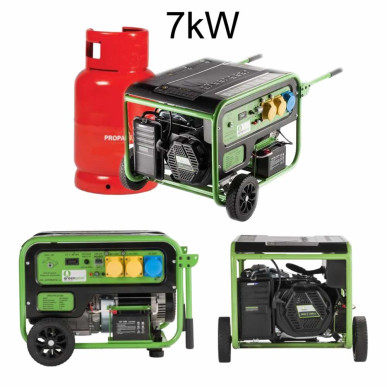- 5265
- 0
Sharing Ideas and Updates on LPG in Nigeria and related information to enable effective collaboration within the LPG Value Chain
Insights Into LPG-Powered Generator Conversion By HydroCIS.

In an effort to equip Nigerians with valuable knowledge, energy data information services firm, HydroCIS, has disseminated crucial information regarding liquefied petroleum gas (LPG)-powered generators. The company recently shared these insights through an illustrative infographic posted on its official LinkedIn page on Monday, August 7.
The Essence of Generator Conversion.
HydroCIS underscores several pivotal aspects to consider during generator conversions:
1. A high-quality cylinder regulator featuring an excess flow shut-off valve.
2. A reliable safety relief component, necessitating re-certification every 5 years and replacement every 15 years. It is imperative that all cylinder valves possess a safety relief.
3. The use of high-quality cable ties to secure gas hoses meticulously.
4. Utilization of a high-quality, high-pressure hose devoid of folds or cuts, requiring replacement every 24 months. Notably, water hoses are inadequate replacements for this purpose.
5. Installation of a top-notch dual fuel carburettor with suitable sizing aligned with the generator's capacity, accompanied by an easily accessible fuel selector switch/knob.
6. Employment of jubilee clips of appropriate size for the pressure hose's diameter, replacing them as needed. Clips should be discarded if bent or broken.
7. Ensuring the generator is firmly positioned during operation, avoiding vibrations that may alter its placement.
Advantages of Generator Conversion.
The transition to LPG offers several benefits, as highlighted by HydroCIS:
1) Enhanced cost-effectiveness due to lower LPG fuel consumption compared to petrol.
2) Reduced maintenance requirements owing to diminished carbon deposits commonly observed with petrol engines.
3) Lesser wear on LPG-powered generator engines, coupled with lower emissions compared to petrol counterparts.
Post-Conversion Steps and Cost Considerations.
Upon deciding to convert to LPG, HydroCIS offers the following guidance:
1. Engage knowledgeable and experienced vendors.
2. Select a suitable conversion kit tailored to the specific engine and employ the correct type of gas.
3. Position gas cylinders and generators in ventilated areas at an appropriate distance from each other, ensuring secure fastening of all accessories.
4. Conduct regular leak tests to ensure the integrity of the setup.
Regarding costs, HydroCIS provides a breakdown:
1) For generators with a rating of 7.5kVA or lower, conversion costs range from N50,000 to N55,000 if the cylinder and all accessories are present. If absent, the cost ranges from N90,000 to N95,000.
2) For generators with a higher rating than 7.5kVA, conversion costs range from N55,000 to N100,000 with all accessories included.
HydroCIS notes that it takes around 150 – 200 hours of operating the LPG-powered generator to recoup conversion expenses. Additionally, using a 12.5kg gas cylinder on a 7.5kVA generator for a 15-hour run time translates to a consumption rate of N500 per hour (subject to load factor). In comparison, a 15-hour runtime on a petrol-powered generator consumes 30 litres of petrol at N1,050 per hour.
LPG in Nigeria can verify the accuracy of HydroCIS's generator run time calculations. Alhaji Dahiru Salihu, a loyal reader and follower of ours, who specializes in distributing substantial quantities of LPG carburetors nationwide, corroborated these calculations. He shared that a LPG-powered generator's run time from 7 am to 7 pm consumes 12.5 kg of gas over a span of 3 days (12 hours per day, totaling 36 hours).
















0 Comment.